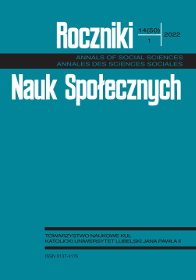Europejski uniwersalizm w dobie kryzysów
Abstrakt
Artykuł przedstawia dyskusję na temat europejskiego uniwersalizmu, którego najważniejszym celem jest upowszechnianie europejskich wartości i idei. W ujęciu historycznym uniwersalizmowi towarzyszyła tendencja do ekspansji gospodarczej i geopolitycznej mocarstw Europy Zachodniej. Renesans europejskiego uniwersalizmu nastąpił wraz z procesami integracji europejskiej. Szczególnym uwarunkowaniem dla odrodzenia tego uniwersalizmu była z jednej strony strategia intelektualistów lewicowych związana z odbudową wpływów politycznych w warunkach integracji europejskiej. Z drugiej strony kolejne kryzysy europejskie wywołały nastroje eurosceptyczne, co skłoniło elity proeuropejskie do mobilizacji społecznej na rzecz Unii Europejskiej. W artykule zostanie omówiona najnowsza odsłona europejskiego uniwersalizmu, który został skierowany głównie do wewnątrz UE w celu przeciwdziałania dezintegracji i ściślejszego oparcia projektu integracyjnego na wartościach europejskich.
Bibliografia
Amin S. (1989), Eurocentrism. Modernity, Religion, and Democracy. A Critique of Eurocentrism and Culturalism, New York: Monthly Review Press.
Balibar É. (2016), Des Universels. Essais et conférences, Paris: Editions Galilée.
Bibo I. (2012), Eseje polityczne, Kraków: Universitas.
Bock-Côté M. (2021), La Révolution racialiste, et autres virus idéologiques, Paris: Place des éditeurs.
Burke E. (2009), Reflections on the Revolution in France, Oxford – New York: Oxford University Press.
Dugin A. (2012), The Fourth Political Theory, Budapest: Arktos Media.
Encyclopedia Britannica, Political Pluralism (2008), [w:] https://www.britannica.com/topic/pluralism-politics [dostęp: 27.12.2021].
Epstein R. A. (2014), Overcoming ‘Economic Backwardness’ in the European Union, Journal of Common Market Studies, 52(1), s. 17-34.
Epstein R. A., Jacoby W. (2014), Eastern Enlargement Ten Years On: Transcending the East–West Divide? Journal of Common Market Studies, 52(1), s. 1-16.
Fei Jiang (2017), A Critical Discourse Analysis of Soft Power, [w:] N. Chitty, L. Ji, G. D. Rawnsley, C. Hayden (red.), The Routledge Handbook of Soft Power, London – New York: Routledge, s. 48-61.
Follesdal A., Hix S. (2006), Why There is a Democratic Deficit in the EU: A Response to Majone and Moravcsik, Journal of Common Market Studies, 44(3), s. 533–562.
Fukuyama F. (1992), The End of History and the Last Man, New York: Free Press.
Giddens A. (1998), The Third Way: The Renewal of Social Democracy, Cambridge: Polity.
Girard R. (1986), The Scapegoat, Baltimore: Johns Hopkins University Press.
Gramsci A. (1971), Selection from the Prison Notebooks of Antonio Gramsci, New York: International Publishers.
Gray J. (2000), Two Faces of Liberalism, Cambridge: Polity Press.
Grosse T. G. (2020), Nation-building oraz nation-preserving w Polsce w dobie transformacji i integracji europejskiej, Studia Polityczne, 49(1), s. 99-123.
Grosse T. G. (2021), Cztery wymiary integracji, Warszawa: Wydawnictwo Sejmowe.
Grosse T. G. (2022), Suwerenność i polityczność. Studium integracji europejskiej, Warszawa: WIWS.
Hazony Y. (2018), The Virtue of Nationalism, New York: Basic Books.
Hechter M. (1975), Internal Colonialism: The Celtic Fringe in British National Development 1536, Berkeley: University of California Press.
Hooghe L., Marks G. (2009), A Postfunctionalist Theory of European Integration: From Permissive Consensus to Constraining Dissensus, British Journal of Political Science, 39(1), s. 1-23.
Hooghe L., Marks G. (2019), Grand Theories of European Integration in the Twenty-First Century, Journal of European Public Policy, 26(8), s. 1113-1133.
Janos A. C. (2000), East Central Europe in the Modern World: The Politics of the Borderlands from Pre-to Postcommunism, Redwood City: Stanford University Press.
Kinnunen T. (2019), Ellen Key and Rudolf Kjellén on War, Peace, and the Future of Post-First World War Europe, Scandinavian Journal of History, 44(2), s. 150-168.
Kuhn T., Solaz H., van Elsas E. J. (2018), Practising What You Preach: How Cosmopolitanism Promotes Willingness to Redistribute across the European Union, Journal of European Public Policy, 25(12), s. 1759-1778.
Legutko R. (2016), The Demon in Democracy: Totalitarian Temptations in Free Societies, New York: Encounter Books.
Mair P. (2007), Political Opposition and the European Union, Government and Opposition, 42(1), s. 1-17.
Manners I. (2002), Normative Power Europe: A Contradiction in Terms? Journal of Common Market Studies, 40(2), s. 235-258.
Moll Ł. (2021), Nomadyczna Europa. Poststrukturalistyczne granice europejskiego uniwersalizmu, Toruń: Wydawnictwo Naukowe Uniwersytetu Mikołaja Kopernika.
Mouffe Ch. (2013), Hegemony, Radical Democracy, and the Political, London – New York: Routledge.
Mouffe Ch., Laclau E. (1985), Hegemony and Socialist Strategy, London – New York: Verso.
Mouffe Ch., Laclau E. (2014), Hegemony and Socialist Strategy, 2 wyd., London – New York: Verso.
Nölke A., Vliegenthart A. (2009), Enlarging the Varieties of Capitalism. The Emergence of Dependent Market Economies in East Central Europe, World Politics, 61(4), s. 670-702.
Nowak A. (2020), Między nieładem a niewolą. Krótka historia myśli politycznej, Kraków: Biały Kruk.
Parlament Europejski (2021), Escalating Humanitarian Crisis on the EU/Belarusian Border: Extracts from the Debate, https://multimedia.europarl.europa.eu/en/escalating-humanitarian-crisis-on-the-eubelarusian-border-extracts-from-the-debate-_I213660-V_v [dostęp: 27.12.2021].
Phillips P. D. (1991), National and World Identities and the Interstate System, [w:] I. Wallerstein (red.), Geopolitics and Geoculture: Essays on the Changing World-System, Cambridge – New York: Cambridge University Press, s. 139-157.
Said E. W. (2017), Orientalism, London: Penguin.
Teney C., Lacewell O. P., De Wilde P. (2014), Winners and Losers of Globalization in Europe: Attitudes and Ideologies, European Political Science Review, 6(4), s. 575-595.
Wallerstein I. (2006), European Universalism: The Rhetoric of Power, New York – London: The New Press.
Wallerstein I. (2021), Structural Crisis of the Modern World-System: Dilemmas of the Left, [w:] I. Wallerstein (red.), The Global Left: Past, Present, and Future, New York: Routledge.
Weko S. (2021), Communitarians, Cosmopolitans, and Climate Change: Why Identity Matters for EU Climate and Energy Policy, Journal of European Public Policy, https://doi.org/10.1080/13501763.2021.1918751.
Wolff L. (1994), Inventing Eastern Europe: The Map of Civilization on the Mind of the Enlightenment, Redwood City: Stanford University Press.
Zamoyski A. (2016), Urojone widmo rewolucji. Tajne spiski i tłumienie ruchów wolnościowych 1789-1848, Kraków: Wydawnictwo Literackie.
Copyright (c) 2022 Roczniki Nauk Społecznych

Utwór dostępny jest na licencji Creative Commons Uznanie autorstwa – Użycie niekomercyjne – Bez utworów zależnych 4.0 Międzynarodowe.


